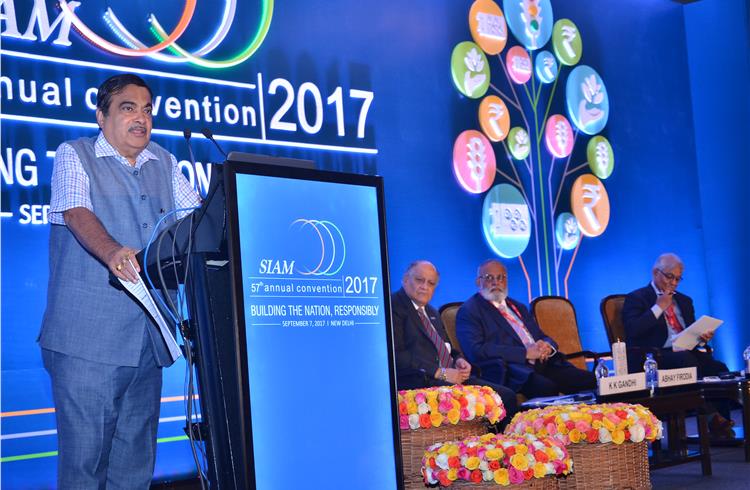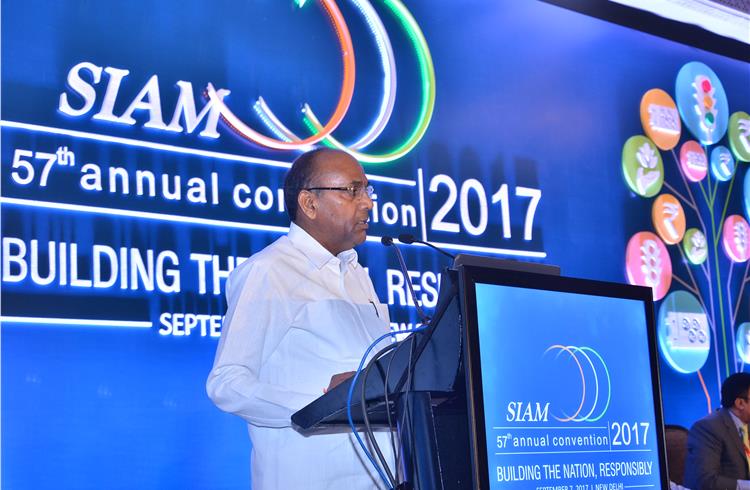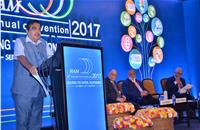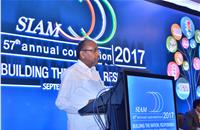Key industry ministers use SIAM platform to urge domestic automakers to think global
Heavy Industries minister Anant Geete and Transport minister Nitin Gadkari urge R&D focus for sustainable growth even as SIAM president Vinod Dasari calls for long-term regulatory roadmap.
The Society of Indian Automobile Manufacturers (SIAM), the apex industry body representing India’s automobile sector, held its 57th Annual Convention today in New Delhi. In line with the theme of ‘Building the Nation, Responsibly’, speakers from the government as well as domestic industry highlighted new challenges evolving globally concerning innovations, reducing dependence on single technology and focusing on R&D for sustainable development of the automobile sector.
Guest of honour, Union Minister of Heavy Industries and Public Enterprises, Anant G Geete said India’s automobile industry has been a primary contributor to the `Make in India’ initiative. “We as the guardian of the automobile sector, assure you that the government will do everything and help the industry by all means. There are concerns raised over GST and its impact on the auto industry. I assure you that it is the duty of the government to offer all help to the industry in this regard.”
Commending the auto sector, Geete said: “The global automobile industry has set up giant manufacturing plants in India. They not only manufacture vehicles for us but also export to other countries globally. Even Euro 6 emission cars are being manufactured and exported globally. At the same time, we have to change with the changing times and adopt to newer technology within the country also”.
Nitin Gadkari, Minister for Road Transport & Highways (MoRTH), reaffirmed the stance of the government’s ambitious plan for having an all-electric vehicle fleet in the country. He said early starters and first movers in this area will reap the benefits. He further said, “We need to focus on reducing imports, promote EV technologies and ensure that many more charging stations come-up soon.” He also mentioned that there was a need for setting-up for electric infrastructure for public transportation.
Kant also pointed out that there has to be clarity, consistency and continuity in the policy and that all policies for the auto sector should be technology agnostic and left to the market forces for its self-sustaining growth.
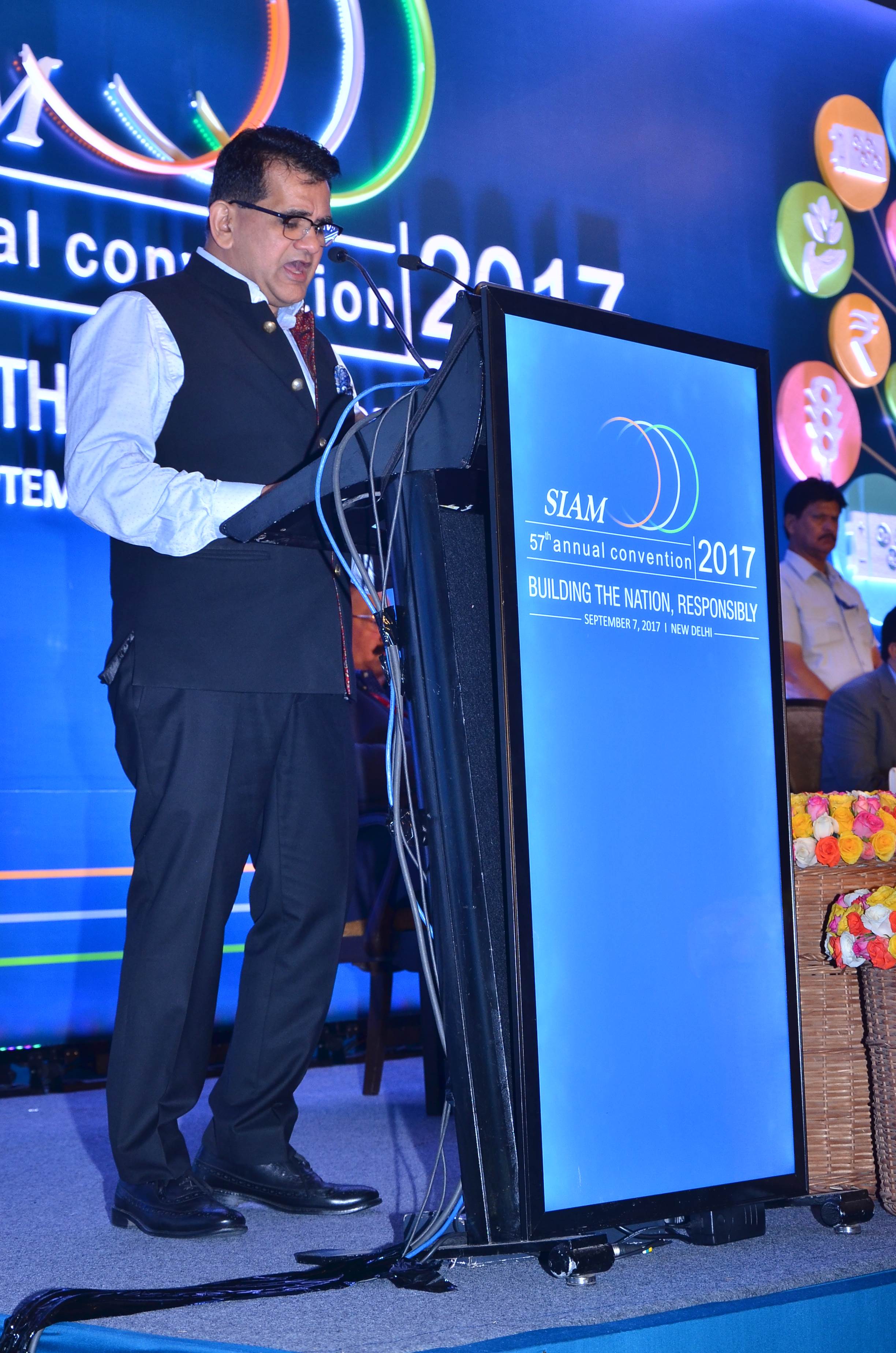
Amitabh Kant, CEO of NITI Aayog, the government’s main policy think-tank, called the domestic automotive industry as the pride of the country and said it plays a very crucial role in India’s growth. “The government feels that the courts should have hands-off approach,” he added.
He said that overdependence on a single technology may scuttle the R&D spirit, innovations and out- of-the-box thinking which may not be helpful for the automotive sector. He pointed out that India’s automobile industry must think of the size and scale that is required and must follow innovation plans.
“The conventional regulatory policies in the automobile sector so far have been incremental and gradual. However, the recent decisions like leapfrogging to BS VI emission norms, 100% electric vehicles by 2030, methanol economy and fuel efficiency norms are transformational and will have fundamental impact on entire automotive ecosystem without any transitional phase,” Kant observed. This is one of the most disruptive phases for the automotive industry globally.
India as a global hub for EVs
Mr Kant also stated that India is catching up fast with the world’s automotive leaders in ‘greening’ mobility by promoting EVs and with alternate cleaner fuels that could provide environmentally sound, seamless and convenient connectivity to urban and rural areas in India creating jobs, improving the lives of masses, and protecting the environment and climate change.
“We should have India as hub for EV growth,” he added. He also called upon the industry to formulate and suggest overall policy for EV promotion. He said India should be the base for zero defect and zero effect’ and with homegrown innovations, India should be the base of manufacturing.
T Mookiah, associate director (R&D), Vikram Sarabhai Space Centre (VSSC), Department of Space, Government of India said the geopolitical situation has made India develop technology through R&D, and today they have developed technologies and on board computer for real time guidance of the launch vehicles. “These technologies can be used by the automotive sector and take a lead in high powered batteries for taking India on E-mobility path.
Industry Speaks
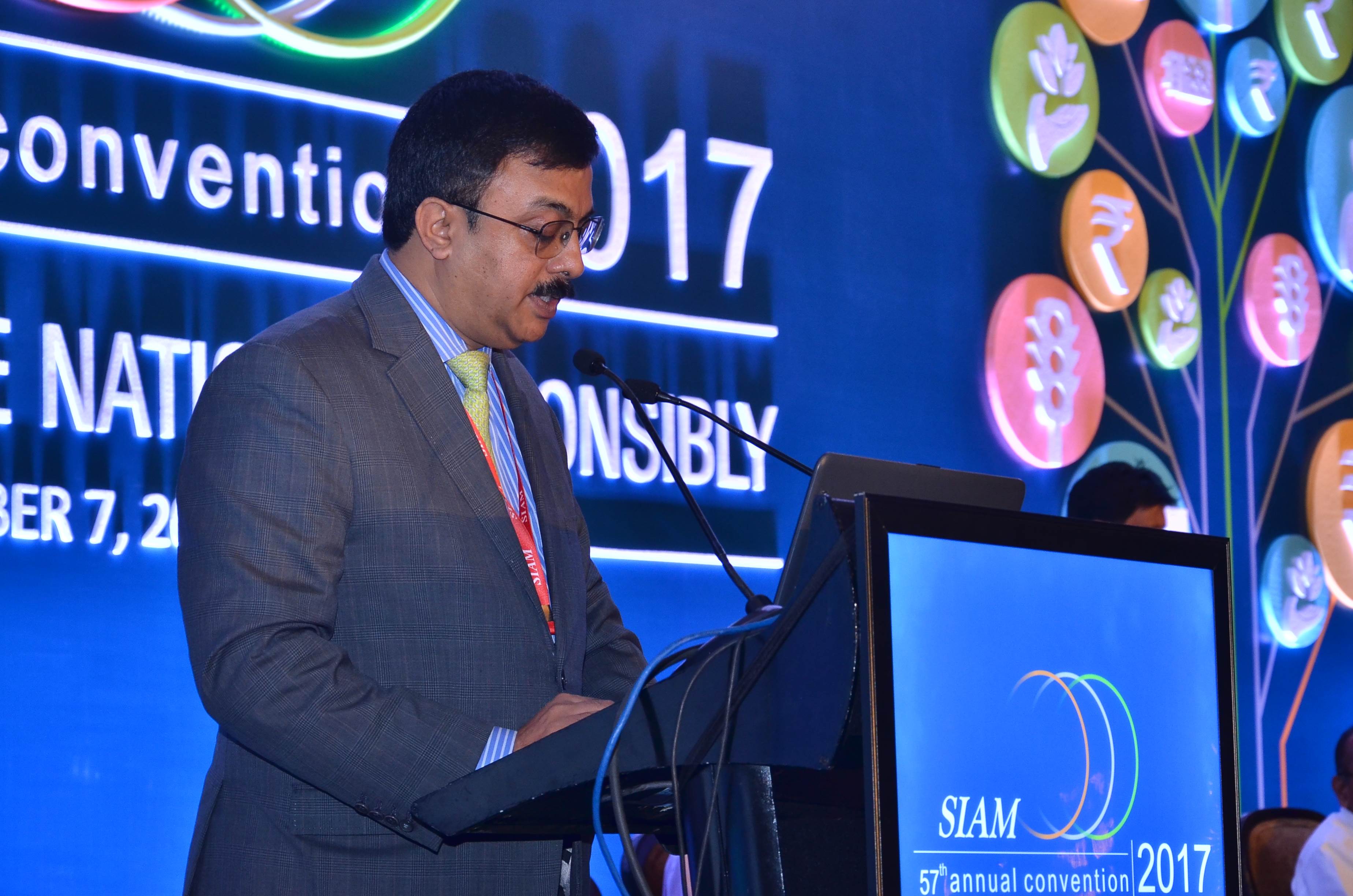
Earlier, while welcoming the delegates, Vinod K Dasari, president, SIAM, and CEO and MD of Ashok Leyland, said India’s automobile industry is today standing on the threshold of major transformations and unprecedented challenges.
Shobana Kamineni, president, Confederation of Indian Industry (CII) and executive vice-chairperson, Apollo Hospitals Enterprise, said NPAs and subdued demand are among the challenges today. “Creating new jobs and industrial infrastructure is also a worry. The auto industry is wherewithal of the entire economy.” She also called for joint initiative in areas for smart manufacturing and skilling.
Dasari urged the government to create a National Automotive Board which considers the concerns of all factions and then prepares a clear and ambitious, long term roadmap for regulations that are in the best interest of the country. “We do not need to simply copy the regulations from Europe,” he pointed out.
Dasari also called for providing greater impetus for doing more Design in India as this is the only way we will gain traction with government’s `Make in India’ initiative. He also appealed to the government to bring in legislation to reduce polluting vehicles and ban vehicles which are more than 15 years old. “To reduce pollution, we have committed to Euro 6 levels in 2020 already. We request that you please bring in legislation to reduce polluting vehicles and ban vehicles which are more than 15 years old,” Dasari explained.
He also announced that as a voluntary measure, SIAM will initiate three more Voluntary Codes of Practice a Full compliance to the Bus Body Code which is ready but yet to be implemented by government, banning use of certain materials in the manufacturing processes for vehicles and components that are now globally known to have hazardous effects on the health of people; and making all Vehicle Recall data available on the SIAM and the MoHI Websites for public consumption.
“Any country with a strong defence force also has a dynamic and committed auto industry that provides the backbone for the defence equipment. India is no different. We generate over 30 million jobs, spend more than 10% of the country’s R&D, and contribute to over half the manufacturing GDP. We are slowly but surely becoming an integral part of the security of our nation,” he stated.
Venu Srinivasan, chairman, TVS Motor Company was optimistic on the GST and demonetisation move and was positive that it will help the country by making the economy transparent. "The most important disruption is the electrification. It is something certainly going to happen by 2030 or 2040, I cannot say. But at least 30 per cent of the vehicle will be electric,” Srinivasan, said.
He further said that India is a player in the global market but it should also be an original engineer as well. “We in the automotive industry must have an approach to move on from Make in India to Made in India. We have created excellent clusters in Chennai, Bengaluru and now Uttarakhand has become a very vibrant cluster. In next ten years, there will be huge growth in passenger vehicle, two wheelers and export volumes will also go up."
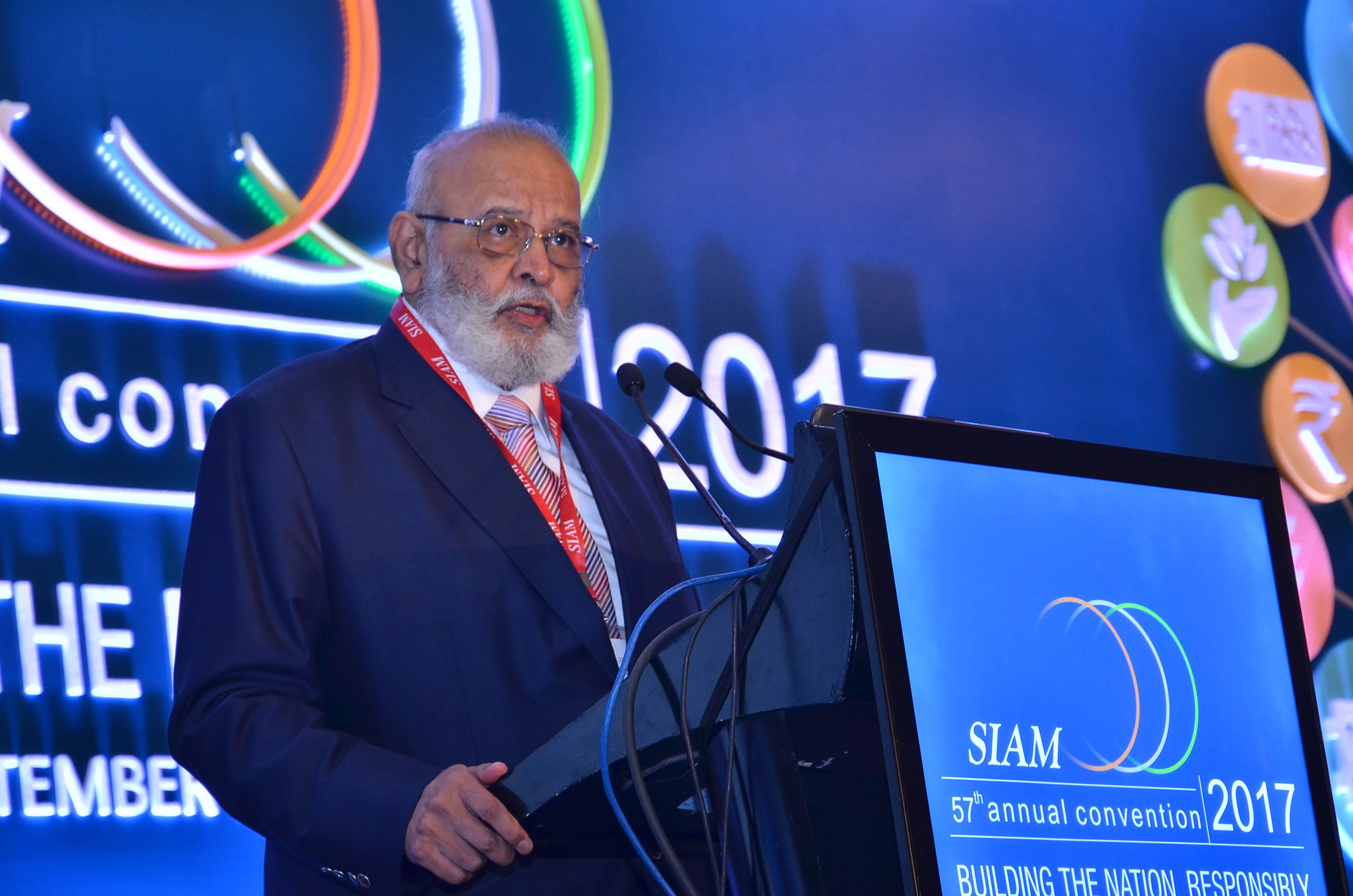
Dr Abhay Firodia, chairman of the Force Motors backed the government's intention and said that the government is closely monitoring the DNA of the manufacturing industry, especially the auto sector in India to ensure that it is as par the global standards.
“It is good that Indian automobile industry is taking up this challenge despite shocks in the past year. We had disruptions due to demonetisation last year. We have the GST now. We had transition to BS IV emission norms in an unplanned manner owing to which we suffered losses. We need a clear, firm policy guidelines concerning fuel, new technologies and clean transport. This would ensure that the industry doesn’t suffer jerks and losses,” Dr Firodia stated.
Dr Firodia further pointed out that there is lot of confusion on many aspects relating to GST. “We need to have a comprehensive automobile policy and we need a favourable policy environment. Safety on roads is a concern for all of us, as over 1.5 lakh people died in the past year. We also urge for the need of more cooperation from the Ministry of Road Transport & Highways for having a robust policy and infrastructure."
Kenichi Ayukawa, Treasurer, SIAM and Managing Director & CEO, Maruti Suzuki India called India a unique country where the auto industry offered a large scale employment. He however pointed out that there are some concerns like issues related to CO2 emissions, growing traffic and accidents.
He said some of the bottlenecks concerning vehicles can be mitigated while working on appropriate designing of the vehicle.
RELATED ARTICLES
Bosch hydrogen engine tech-powered truck to be on Indian roads this year
The global supplier of technology and services is betting big on both electromobility and hydrogen. While announcing the...
IIT Bombay inaugurates Arun Firodia Research Floor
IIT Bombay, one of India’s top technical and research institutions, honours Kinetic Group chairman Dr Arun Firodia, one ...
Maruti Suzuki expands capacity at Manesar plant by additional 100,000 units
New assembly line at Plant A expands total manufacturing capacity at the Manesar plants to 900,000 units per annum. Alon...





 By Autocar Pro News Desk
By Autocar Pro News Desk
 07 Sep 2017
07 Sep 2017
 4994 Views
4994 Views



